Rise Timeline
To celebrate Rise’s 15th anniversary, we’re sharing our own story to highlight the parents who built Rise, the events that have shaped our work, and the impact we’ve had. As we move toward a new vision, we honor our relationships and our roots.
-
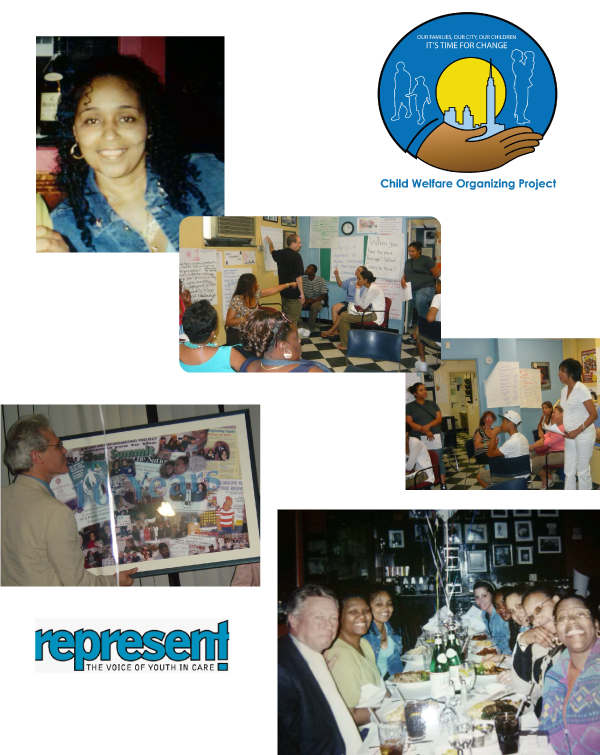 •
•1990s
Inhumane Family Separations, Emerging Advocacy: Child welfare emerged as a critical justice issue for Black and brown families in New York City and many large cities nationwide during the late 1980s and 1990s, when sensational coverage of “crack babies” “welfare queens” and “super-predators,” combined with images of horrific abuse, such as Eliza Izquierdo’s death in 1995, demonized Black women and created intense public pressure to separate Black families.
- In NYC, 50,000 children were in foster care in 1991 and 35,000 children were removed from home between 1996-98, including 1 in 10 children in Central Harlem.
- Parents had no support and minimal legal representation. Many children suffered in foster care for their entire childhood.
- In NYC, advocacy began with Represent, a magazine by and for youth in foster care, founded in 1993, and the Child Welfare Organizing Project, founded in 1994, as well as other organizations, many supported by the Child Welfare Fund.
-
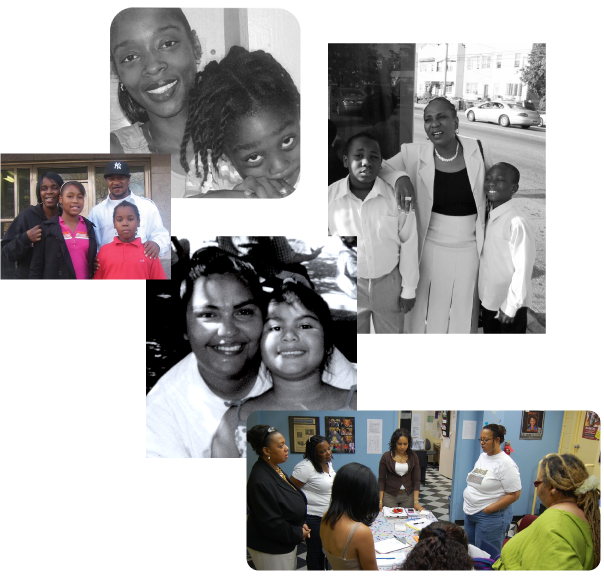 •
•2001
Publishing Parents’ Perspectives: Represent and CWOP collaborated to publish a Parents’ Perspectives column in Represent to provide a platform for parents and help young people understand their parents’ experiences. Represent editors Rachel Blustain, who became Rise’s editor, and Nora McCarthy, Rise’s founder, ran writing workshops at CWOP.
“When a parent calls CWOP, I introduce myself and the organization. I let the parents speak because they just want someone to listen to what they have to say. Often they say, ‘Thank you for listening.’ Many times I let them know I’ve been affected by the child welfare system, too.
By coming here and getting information, parents learn how to advocate for themselves. Parents find family here at CWOP. Listening and participating in Support Group gives parents the knowledge and power to fight their cases better than they could alone.” – Teresa Bachiller
-
 •
•2004
Illuminating the Harm of the ‘Crack Baby’ Myth: Represent published a special issue debunking the myth that ‘crack babies’ were irreparably harmed and that separating children from their parents because of drug exposure is justified. Robbyne Wiley, now a Rise Parent Leader, read her story Pieces Missing on NPR and the issue was covered in dozens of newspapers.
“My children never were abused at home, and if they’d been returned to me more quickly after I quit using drugs, my family might not still be hurting so much. I believe foster care hurt my youngest the most. Because we weren’t together when he was young, I don’t think my son and I ever bonded. He doesn’t look at me the way my other children do, and I don’t feel about him the same way I do about my other children. That hurts both of us.” – Robbyne Wiley
-
 •
•2005
Launch of Rise Magazine: Rise published its first issue–on visits–in June 2005. The goal of the magazine was to offer parents information and peer support to navigate the system and to counter biased media coverage with a more accurate representation of impacted parents.
“When my daughter was in foster care, my caseworker seemed not to care about my feelings. When I met with her, I felt the system hanging over me. She seemed to look down on me, as if I didn’t feel a mother’s love for my child.” - Anonymous
“It took two days for the system to put me in touch with my son. During those two days without my son, I couldn’t sleep or eat. Not knowing what was going on was hard. My family and friends comforted me and prayed for my son’s safe passage through this hell.” - Kevin Edwards
-
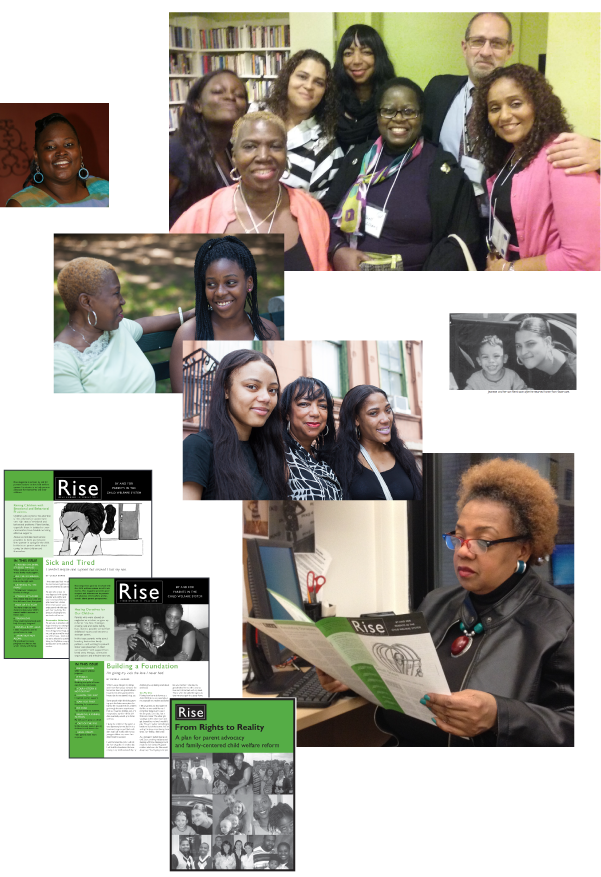 •
•2005-2008
Amplifying Advocacy: Fifteen years ago, parents’ consistent message was, ‘I needed support, not separation.’ 18,000 NYC children were in foster care and advocates pushed for preventive services to keep families intact. Punishment disproportionately affected Black and Native American families, especially; they were–and are still today–more likely to be reported, more likely to be separated instead of supported, and more likely to remain in foster care compared to white children in cases with similar allegations.
- To publish issues representing a wide array of parents, Rise held 18 writing workshops at CWOP and a dozen other organizations that worked with parents impacted by child welfare and domestic violence, incarceration, immigration, mental illness and poverty.
- A core group of parent writers including Sylvia Perez, Tracey Carter, Bevanjae Kelley, Carmen Caban, Youshell Williams, Sabra Jackson and Jeanette Vega published story after story, began reporting and formed an Editorial Board that made decisions about Rise content.
- With more than 50 parents from a dozen organizations nationwide, Rise developed From Rights to Reality: A blueprint for parent advocacy and family-centered child welfare reform, which documented the policies and practices that harm or help parents.
-
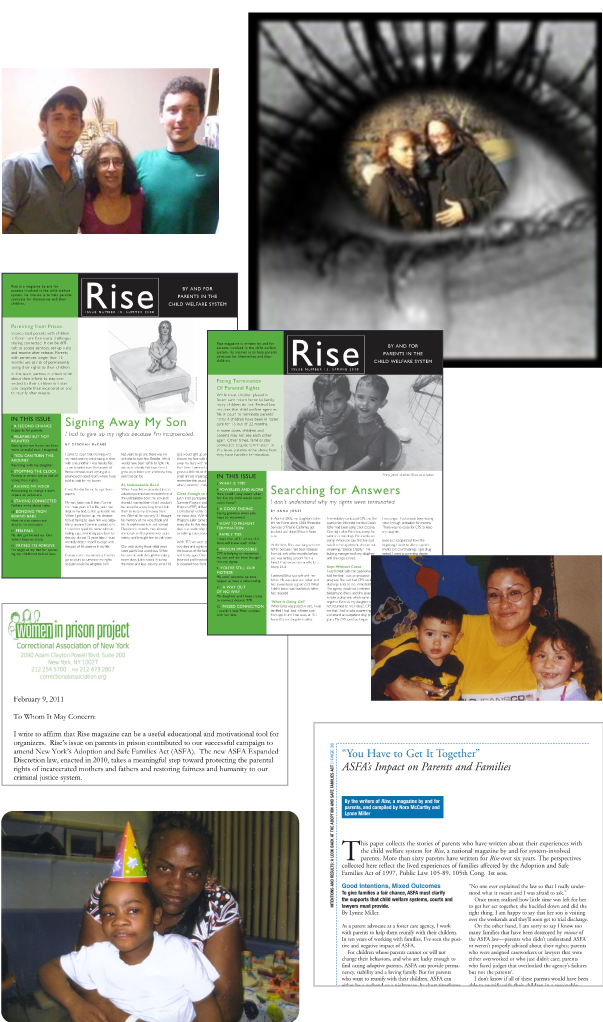 •
•2008-10
Fighting ASFA: The 1997 federal Adoption and Safe Families Act (ASFA), passed soon after the 1994 crime bill that launched mass incarceration, incentivized adoption and gave parents just 15 months to reunify before states could permanently terminate their rights.
- Lynne Miller, a Rise writer and board member, presented a parent-written paper at a CSSP briefing for Congressional representatives about ASFA’s impact on families, arguing that the requirement that states make “reasonable efforts” to assist families in reunifying must be strengthened.
- ASFA particularly impacted parents in prison and inpatient addiction treatment. With the Osborne Association, Rise published stories of parents in prison, which the Correctional Association used to educate legislators and community advocates to support passage of New York State’s 2010 law to extend ASFA timelines. Rise writer Chrystal Reddick was featured in a City Limits article and spoke in Albany in support of the bill.
- Rise’s issue on termination of parental rights (TPR) focused on bonds that can’t be broken by a court order, a reality documented by research showing that former foster youth frequently returned to family after foster care and that ‘broken adoptions’ are frequent, leading to a spate of state laws allowing courts to reinstate parents’ legal rights after TPR.
- Today, Rise’s publishing and advocacy around ASFA continues, as activists increasingly demand that this legislation be replaced.
-
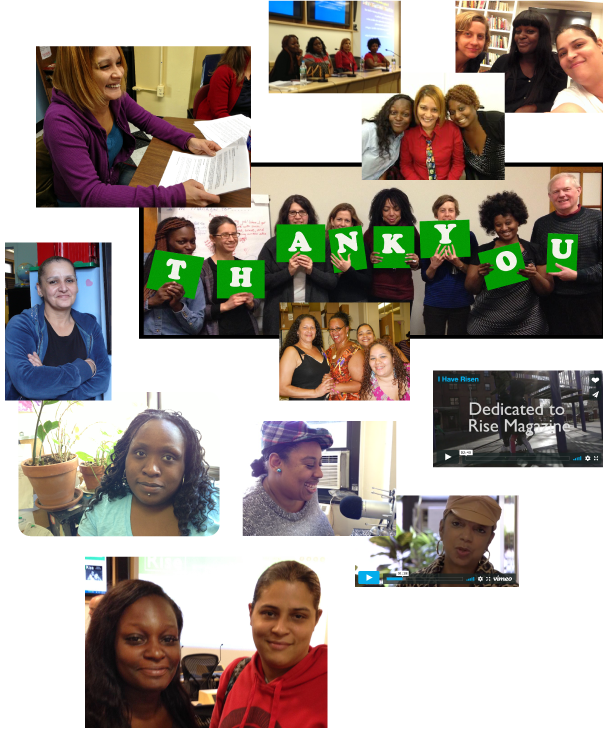 •
•2009-2015
Building Parent Leadership: Despite a budget of less than $85,000/year until 2013, Rise hired its first parent leader, Jeanette Vega, in 2010.
- In 2011, Rise hired Piazadora Footman, who helped build Rise over 6 years, writing and reporting more than 20 articles and leading the addition of a public speaking program at Rise.
- Longtime writers Evelyn Salazar, Ilka Perez and Nicole Goodwin joined Rise, and in 2013, Rise hired three parent contributors part-time: Antoinette Robinson, Sonia Diaz and Erica Harrigan.
- In 2014, Rise became a partner project of the Fund for the City of New York, after years of fiscal sponsorship by Youth Communication, and formed a governing board.
- In 2015, Rise began offering public speaking workshops and created paid project teams staffed by parents. Rise’s video ‘I Have Risen’ and In Our Own Words gave voice to Rise as it grew into an organization.
-
 •
•2012
Making Parents Visible in the Media: From 2012-14, The New York Times published Rise parent stories on the trauma of serving in Iraq, reunification from foster care, domestic violence, low-income housing and racism in schools.
Every year, Rise stories were reprinted by Youth Today, NCCPR, Child Welfare Watch, CW360 and dozens of trade publications nationwide. Rise also was featured in From Pariahs to Partners, David Tobis’ book on parent advocacy.
-
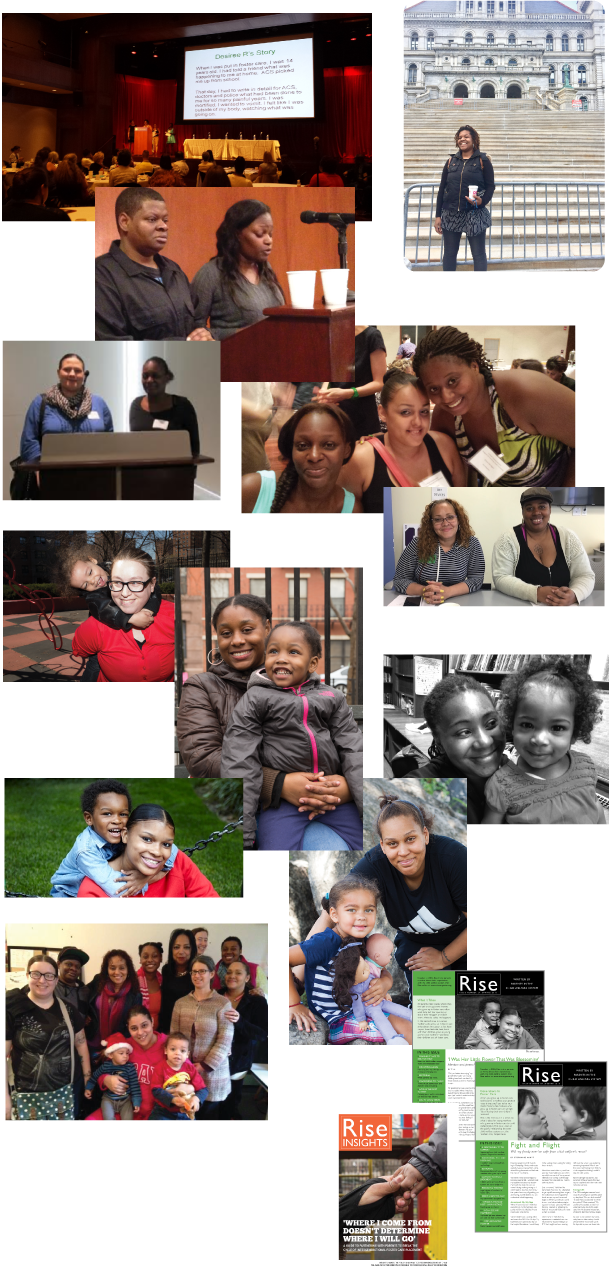 •
•2013-20
Advocating to End Generations in Foster Care: The worst nightmare for many former foster youth is that they lose their own children to the system. Yet lack of resources and exposure to child welfare put these young parents at higher risk; 40% of Rise writers grew up in foster care themselves.
In 2012, when Rise began working to end intergenerational foster care placement, one-third of New York City foster youth lost custody of their own child while still in foster care. By 2017, that dropped to one in five. Rise:
- Ran annual writing groups for young parents who grew up in foster care, publishing the issues What It Takes and Someone to Turn To and collaborating with the Center for Family Representation on Know Your Rights trainings for parents in foster care.
- Published a white paper and partnered with CSSP to convene a citywide circle of advocates, led by young parents, that addresses policies and practices that put youth at risk.
- Supported advocacy by young mothers who grew up in foster care: Sara Werner, Sharkkarah Harrison, Dominique Arrington, Latoya Fitzgerald, Lindsey Reilly, Melissa Landrau, Laquana Chappelle, Mariya Kolesnichenko and many more.
-
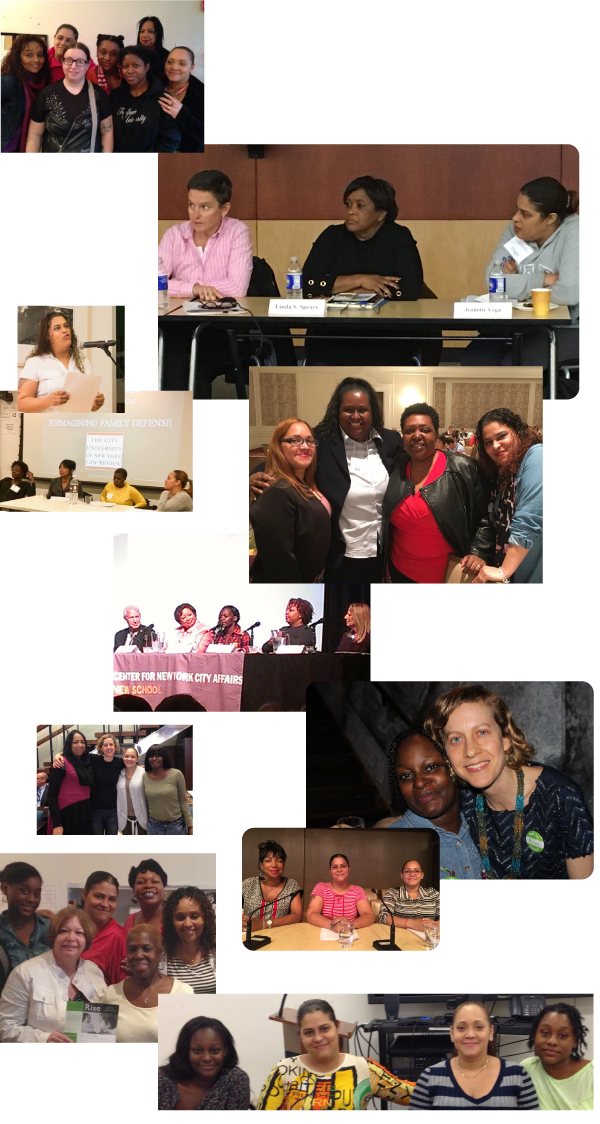 •
•2015-18
Speaking Up: Rise parent leaders began testifying to legislators and speaking to thousands of attorneys, judges, child welfare leadership, frontline workers and journalists every year. In 2015, three impacted parents joined the staff: current Assistant Director for Training and Policy Jeanette Vega, Senior Parent Leader Robbyne Wiley and Senior Parent Leader Nancy Fortunato.
- Court Project: Rise presented on parents’ experiences and recommendations for family court in Manhattan, Bronx, Queens and Brooklyn Family Courts; at a CUNY Law School forum; and at the American Bar Association Parent Attorney Conference.
- Family First Prevention Act: Rise met with 11 congressional staffers about funding services that can prevent family separation.
- Parents’ Priorities for Frontline Practice in NYC: A team of 6 Rise parent leaders ran focus groups with 40 parents with open cases and presented parents’ priorities to ACS Commissioner Gladys Carrion, leading to an investment in improvements of parent-child visiting.
- Training for staff: Rise parents trained staff at Center for Family Representation, Bronx Family Court, CASA, National Child Traumatic Stress Network, ACS, New York Zero-to-Three Network, Schuyler Center, COFCCA, American Bar Association and New York State Defenders Association, as well as many others.
- Policy and Practice Reform: Rise parent leaders served on NYC’s Citywide Task Force on Foster Care, the New York State Parental Representation Commission and other task forces.
- Reunification Month: Rise worked with the American Bar Association to encourage celebrations of National Reunification Month, and Rise parents have spoken at events in NJ and every year in NYC.
“The worst was hearing about my history over and over again in court. I had to endure fancy people not caring about my story, people misjudging me and categorizing me and making decisions for me. I had to answer to people who seemed to loathe me.
As time passed, all of my experiences of being powerless—being abused and gang raped and going to prison—came together in my mind. Being told when I could and couldn’t see my child and what I should and shouldn’t do during visits came to feel like another kind of abuse.” - Chrystal Reddick
“Before child welfare came into my family’s life, my understanding of the court system was that truth is found by careful and dutiful dissection in the court room; evidence is paramount and lies are dissolved. However, I have come to learn that in child welfare, there are flaws that tilt the scales of justice.
The family is considered guilty until proven innocent. The judge is the decider, no jury required. The child welfare system has funds for legal representation and experts, while most families do not. Children may be taken instantly, on little evidence, and their time apart from family is of no consequence to the system.” - Jim Dossett
-
 •
•2016-2020
Investing in Reunification: In New York City, fewer than one-third of families reunify within one year of separation. Nationwide, only half of children ever return home. To support parents facing the trauma, stress, isolation and despair of family separation, Rise collaborated with dozens of parents, attorneys and frontline foster care staff to create informational handouts and videos for parents. Rise trains parent advocates, frontline staff and attorneys across NYC to share them with parents.
- Visiting TIPS handouts and videos: Focus on parents’ rights, coping with trauma and creating routines to meet children’s needs.
- Service Planning TIPS handouts: Guidance on managing shame and stress, replacing survival skills with coping skills, and self-advocating and negotiating for what your family needs.
- Reunification Collaborative: Rise is partnering with CSSP and 6 foster care agencies for two years to develop practices to orient and support parents in the first 90 days after a child enters foster care.
“The night before Thanksgiving I felt so desperate I had to do something. I made a flag that was 3 feet by 4 feet that I mounted to my bike. On one side the flag said, 'Do not use drugs or alcohol because it will take your children away.' On the other side it said, 'Please GOD watch over Jayme and Sheryl.'
I set out on the morning of Thanksgiving with that flag on my bike and rode from church to church praying for God to help me get my kids back. At the last church I fell off my bike and was lying on the ground looking up into the sky, telling God, “If I ever needed your help it is right now.” At that moment something miraculous happened. I had energy like I had not had in a long time.” - James X. Sumrow
-
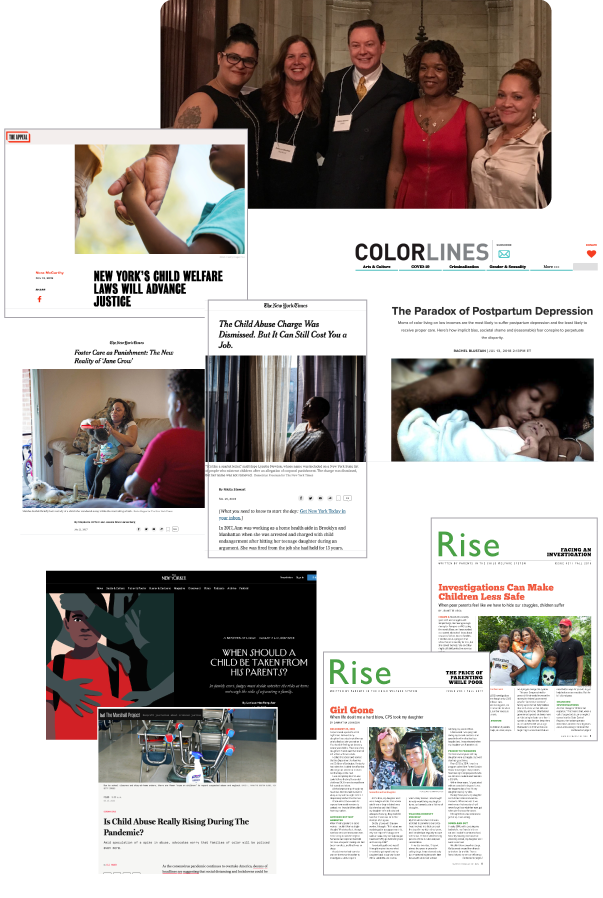 •
•2016-2020
Challenging the Media Narrative: Through reprints of parents’ stories, original reporting, letters to the editor, op-eds, and interviews, Rise has worked to shift public images of parents in publications including The New York Times, the Marshall Project, The Appeal, Fusion, Slate, Jezebel, The Imprint, The Daily Beast, City Limits, The Nation, The New Republic, Colorlines and the Daily News.
In 2016, Rise documented the trauma of investigations and, in 2017, the price of parenting while poor.
Media began to significantly shift with 2017’s Foster Care As Punishment: The New Reality of Jane Crow in The New York Times and When Should a Child Be Taken From His Parents? in The New Yorker.
In 2018, NPR’s LatinoUSA interviewed Rise for In the Hands of the State and Andrew Solomon included Rise parents in New Family Values.
In 2019, The New York Times covered two parent-led legislative efforts – to preserve family bonds after adoption and to reform the state central registry.
-
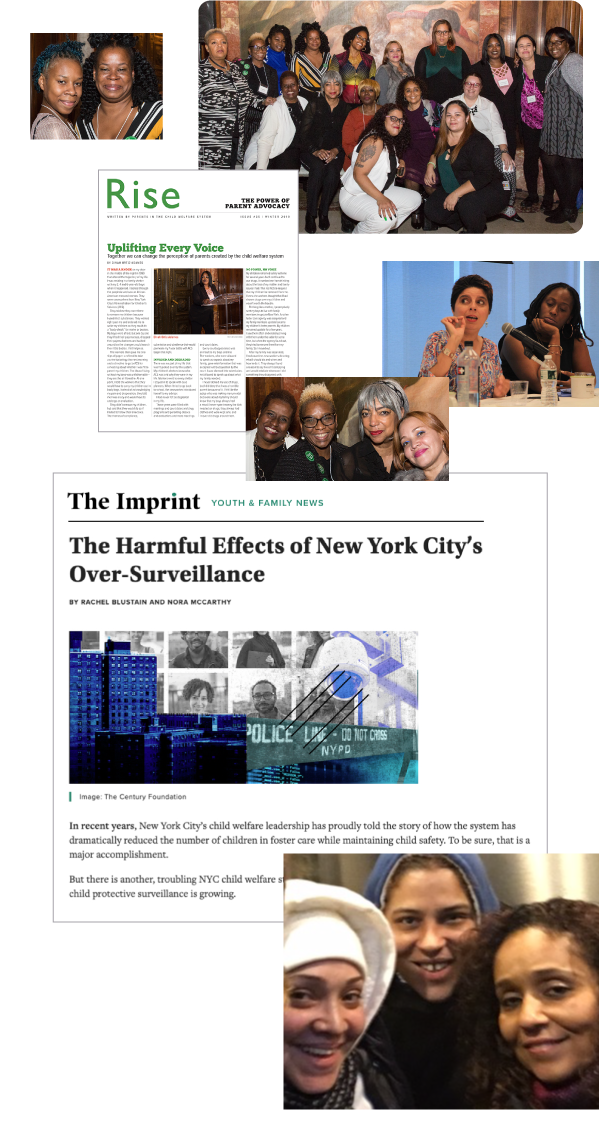 •
•2018
A New Vision: Advocating for Families to Live Free of Child Welfare Policing and Punishment: In 2017, the horrific murder of Zymere Perkins ended the city child welfare agency’s trajectory away from policing and punishment. Media fell back on false and biased narratives. The number of investigations, emergency removals and court-ordered supervision of families all jumped. In 2017 and 2018, more new families entered child welfare supervision each year than at the hysterical height of the crack epidemic. This time, the system used tactics of surveillance and intrusion rather than separation, terrifying families but remaining below the radar of the public.
- In 2018, Rise staff stepped back to name a new goal and new strategy: To mobilize parents to address root causes of child welfare in impacted communities in order to keep families free of contact with the child welfare system, and to build a pipeline of parent leadership within Rise and in impacted communities.
- Rise celebrated the growing power of the parent advocacy movement nationwide– including allies in Washington State, Minnesota, Chicago, Florida, Oregon, Michigan, New Mexico–as well as across the globe.
- Current Assistant Director for Programs and Culture Bianca Shaw and Senior Parent Leader Keyna Franklin joined the staff.
- Rise celebrated the growing power of the parent advocacy movement nationwide– including allies in Washington State, Minnesota, Chicago, Florida, Oregon, Michigan, New Mexico–as well as across the globe.
“The foster care system doesn’t need to exist the way it does right now. This is not a child safety crisis, it’s a poverty crisis, a racism crisis.
To really change the system, you would have to change society. You would have to end poverty. You would have to get rid of violence. Mental health, substance abuse—these are symptoms. You would have to change how people have to cope and survive in their communities.” - Sarah Harris interview with Jessica Chandler
-
 •
•2019
Launching Rise & Shine to Invest in Parent Leadership: In 2019 and 2020, Rise ran its first two sessions of our 18-week, parent-led leadership program to prepare 10 parents each year to lead at Rise and in aligned community justice movements. Rise & Shine supports healing and community and builds knowledge, writing, public speaking and community organizing skills.
- Current Rise & Shine Coordinator Teresa Bachiller, the former assistant director of CWOP, joined the staff.
- Watch our 2019 video and 2020 graduation video and read our 2019 and 2020 Program Report to learn more.
Addressing the Harm of Surveillance: In a 2019 series, Rise parents documented how unnecessary investigations and monitoring of families traumatize parents and children and draw resources away from the real help parents need.
- City Council funded NYC’s family defender agencies to offer legal counsel during investigations and introduced a slate of bills to better protect parents rights in an investigation, such as a Miranda-type warning. Rise parents testified about the need for early representation and for parents to be informed of their rights.
- Rise created FacebookLive Know Your Rights videos with Bronx Defenders, Brooklyn Defenders and Center for Family Representation.
- In 2020, New York State passed a law to raise the standard of evidence to find parents guilty of neglect and limited the time parents are listed on the state central registry. Through PLAN (Parent Legislative Action Network), Rise parents spoke to legislators, wrote op-eds and shared their experiences with media to advocate for the bill.
“The best part of the group was having a safe space to be, think, feel, and speak freely and honestly. We had the opportunity to speak raw and uncut about the injustices and shortfalls of systems and people without censorship. We got to be our unapologetic self and it felt so freeing!”
“The lessons gave me a better outlook of how we will want to build our communities. It gave me the willpower to be where I live now. It prepared me to be a better community leader and to voice myself to the community.”
“ACS investigations have the ability to inflict harm than can shred family bonds and undermine parental authority. It often feels as though ACS takes advantage of the fact that the low-income Black and brown families they investigate do not know they can refuse to answer their questions or submit to the often intrusive nature of their requests.
The investigation lays the foundation for how the case is going to proceed. Having someone present during the investigation to tell you how to protect your rights could change the trajectory of the case.” - Hope Newton
-
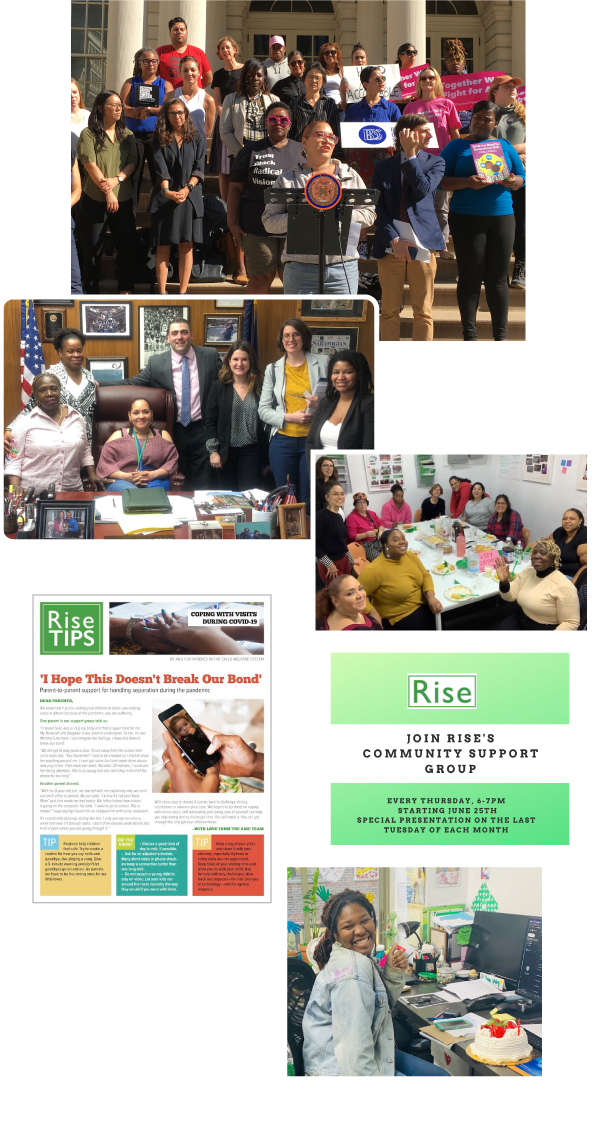 •
•2019-2020
Rise Today: Today Rise is led by 11 staff, two-thirds of whom have been impacted by child welfare systems, along with 9 paid contributors who are graduates of our programs.
- Development Director Genevieve Saavedra Dalton Parker joined the staff in 2019 as did Editorial Director Tracy Serdjenian. Program Assistant Ashanti Bryant and Community Coordinator Halimah Washington joined in 2020.
- During the COVID-19 pandemic, Rise has documented the impact of the pandemic on parents with children in foster care, shared resources and started a weekly Zoom support group for parents.
- Rise committed to an anti-oppressive and trauma-informed culture shift and deep investment in leadership by impacted parents and women of color.
“Black people have tried every possible way to protect themselves and their loved ones from violent systems. Yet, the response to people pained by generations of systemic violence has been continued police violence. Police murder and brutalize nonviolent black people with their hands up. Similarly, we come to the child welfare system with our hands up, and still our babies are snatched away.
Other approaches, visions and possibilities exist. Healing is a part of justice. Rise stands with all those working to heal, invest in communities and grow a safe and strong society led by the wisdom of parents, families and communities most impacted by oppression.” - The Rise Team
-
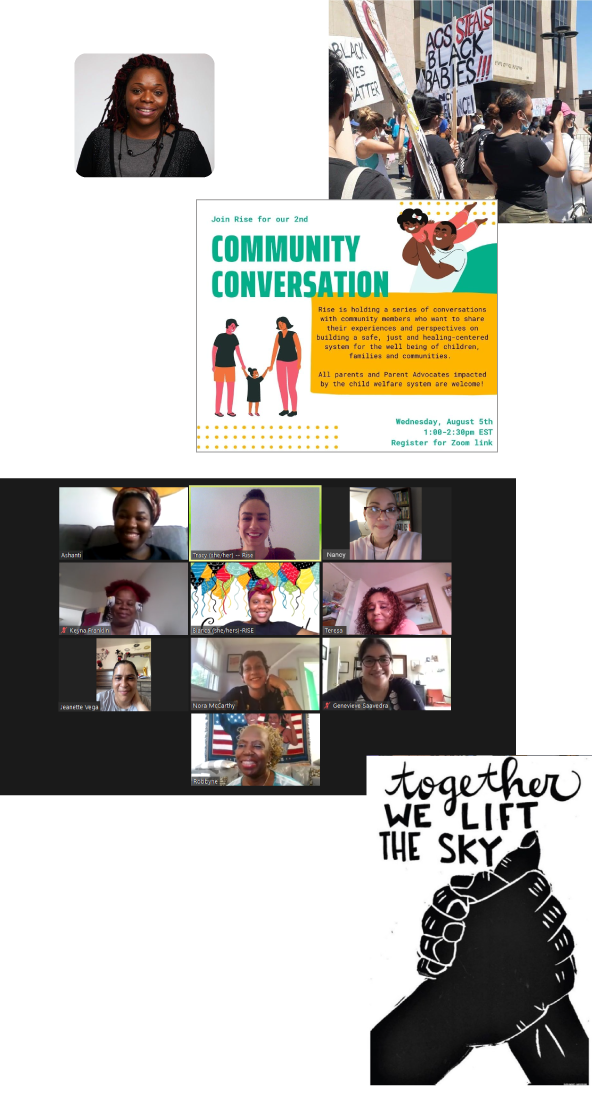 •
•2020
Organizing for Radical Change:
- Nationwide, we see a growing recognition that structural racism and inequity are at the root of child welfare involvement and that all families deserve the resources to thrive.
- At Rise, we envision communities that are free from injustice, family regulation and separation, and a society that is cultivating new ways of preventing and addressing harm. We imagine a radical commitment to ensuring that all families have what they need to live beyond survival and truly thrive.
- We are guided by our values and committed to centering parents in the struggle to dismantle systems of oppression. We believe that parents have the answers for their families and communities. Our mission is to support parents’ leadership to dismantle the current child welfare system, eliminate cycles of harm, surveillance and punishment and create communities that invest in families and offer collective care, healing and support.
- We are connecting to community-led transformative and restorative justice movements to create new ways of preventing and addressing harm without punishment, shaming, isolation and separation.
- We are learning and growing as part of a movement to rethink how our society supports families and to abolish punitive and policing systems, including child welfare.
- Watch our Vision Webinar to learn more
- Get involved with Rise
We envision communities that are free from injustice, family regulation and separation, and a society that is cultivating new ways of preventing and addressing harm. We imagine a radical commitment to ensuring that all families have what they need to live beyond survival and truly thrive.
Led by parents impacted by the child welfare system, Rise believes that parents have the answers for their families and communities. Our mission is to support parents’ leadership to dismantle the current child welfare system, eliminate cycles of harm, surveillance and punishment and create communities that invest in families and offer collective care, healing and support.
